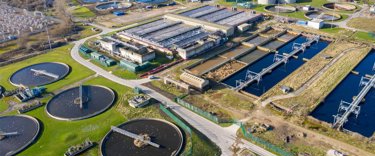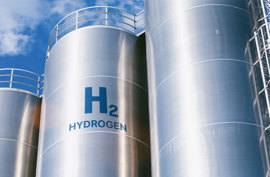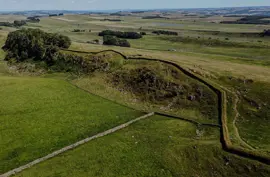AMP8: Why partnerships and innovative asset management will win the day
Colum Goodchild, director of asset strategy at Aqua Consultants, argues water companies must do more with less and work closely with local communities and other stakeholders to manage assets effectively, tackle environmental issues, and rebuild faith in the sector.
The business plans are in for AMP8 and there is distance to run on the regulatory process, but companies can’t wait until 1 April 2025 to get started. They need to make the shift to working in an AMP8 way now.
While there may be a temptation to keep doing the things that worked well in the past, I believe that collaboration and co-creation will be key to success in AMP8. That could be with the supply chain, local authorities, wildlife trusts, community organisations, or charities. Water companies will be under pressure financially but will need to deliver more.
There will need to be a step up in terms of environmental programmes and freeing up time and energy to focus on the environment by simplifying maintenance as much as possible.
Some of our customers are forecasting an overspend on their AMP7 programmes, which creates a sense of needing to pull back financially. But at the same time, they need to scale up for AMP8. It’s difficult to balance these demands.
That’s particularly true when it comes to the environment. It’s difficult to publicly say ‘we are going to do loads for the environment in three years’ time, but we are scaling back pollution programmes’. If that mission is important, it is important now.

Improving public perception and getting data right
As engineers and asset managers, we can be technically right and publicly wrong. A smart engineer can sit down and explain why a spill from a sewer is within a certain framework and normal operating parameters. Public opinion doesn’t buy that.
It’s important not to get hung up on the technicalities of the argument. We may be technically right, but it’s important not to stand on the hill and defend that. Instead, we need to ask, ‘how can we do better?’ How can we change and move toward systems customers want?
That is a long-term journey that will require maximum efficiency. It means getting the most out of every pound spent though optimising designs and contracts and innovative asset management decision-making processes. We need to be crystal clear on the outcome or output we want to deliver and help water companies work backwards to the most efficient, lowest costs means of delivery.
An example of that for AMP8 is around nature-based solutions. Nature-based solutions are a really good concept, and great PR, but at the same time there are risks associated with them, because they are more uncertain. But if nature-based solutions are factored in from the beginning as a default approach, rather than being an add-on, stakeholders can be engaged in their creation and risks clearly understood and managed.
Here, asset management process changes also mean winning hearts and minds and changing company culture. Nature-based solutions require different skillsets. We need to put the structures in place to enable companies to make brave decisions about them, and work on these projects with local communities, whether that’s in terms of creating a habitat for wildlife or a recreational opportunity.
When it comes to improved asset management, digitalisation will also play a role, but it’s important not to digitalise and automate just for the sake of it. There are some maintenance activities where simple, traditional, and manual approaches are also the most efficient approach. Generating data for data’s sake should be avoided.
For example, we had a customer that wanted to collect more than 100 data points about each of their strategic valves. Realistically, in the field, even the most diligent operative is not going to be able to do that. What they actually needed to make decisions was less than 10, which is much more realistic to collect.
So, don’t collect data that you don’t need. Collect data that will enable you to make better decisions. Even the best, most competent engineers can lose sight of the end goal when it comes to digitalisation.
Leakage: A case of diminishing returns
Addressing leakage in AMP8 requires a cost-benefit value assessment and comparing it to other water resource management activities. You can repair pipes, you can replace them completely, you can put more boots on the ground to detect leaks faster, but you need to consider a full suite of benefits and carbon costs when you get towards diminishing returns, because your return on investment is also reducing.
Once you have reduced the larger, obvious leaks, locating and solving the smaller leaks becomes harder. You may get to a point where you end up digging a hole to save a cupful, which is inefficient.
Due to climate change, we are seeing more movement of soil, especially clay soil, so polyethylene pipe is desirable because it flexes. We may see more leakage in summer (when companies may also be challenged by drought) because of increased shrink/swell of soils but less in warmer winters, where traditionally freeze-thaw tended to damage pipes.
Again, public perception is an important factor: telling people to use less water and imposing hosepipe bans are difficult messages to put across if your network is prone to leakage in the summer.
Ultimately, of course, we want to be seen as neither polluters or leakers. So it’s important we start to have constructive conversations with all the stakeholders involved. It is through relationships with all stakeholders that we will rebuild trust – and allow our clever engineering to come to fruition.
Latest resources
 News
NewsAqua Consultants secures place on Cadent Gas business strategy services framework
 Case study
Case studyAssessing New Zealand’s hydrogen feasibility as part of their journey towards a decarbonised future
 Case study
Case studyUnlocking the potential of biomethane for South West Water
 Insights
InsightsSerious gaming: A solution to long-term planning in the water sector
Here to solve your biggest challenges and grow sustainable value
Our expert consultants are available to broaden your thinking, lead transformation, and help you achieve successful outcomes.
Contact our experts

